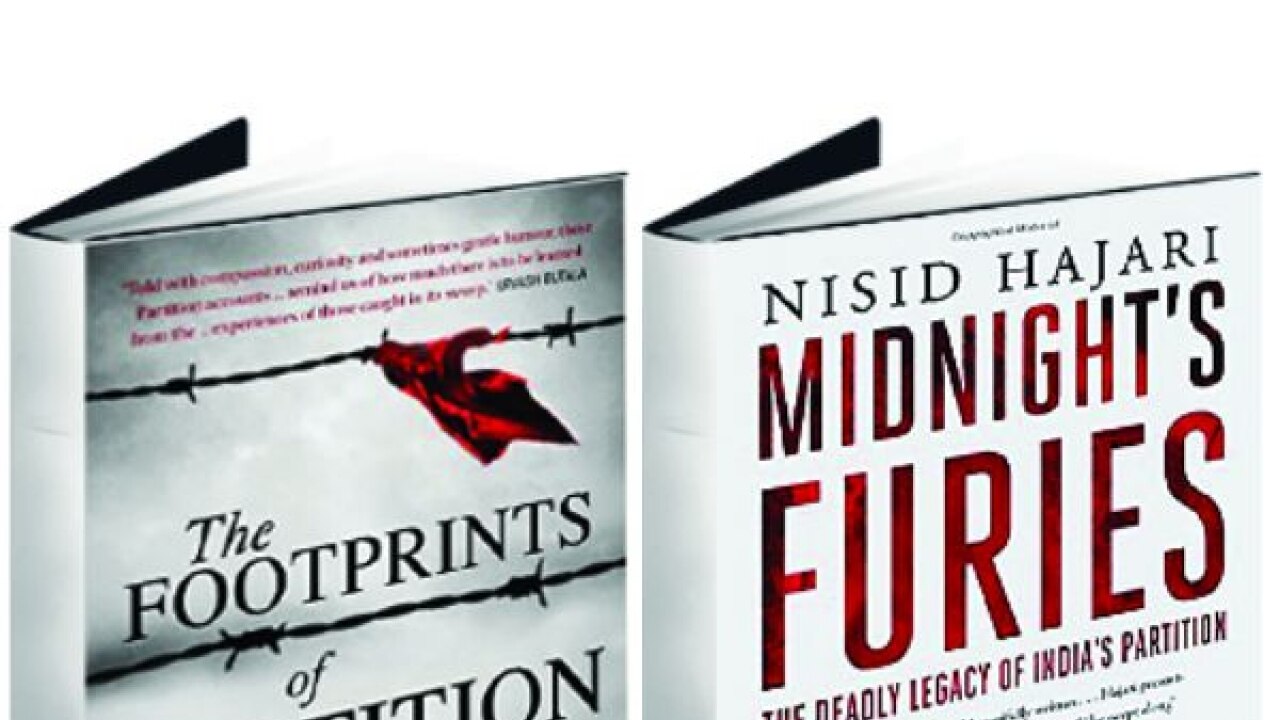
Book: The Footprints Of Partition: Narratives of Four Generations Of Pakistanis And Indians
Author: Anam Zakaria
Publisher: HarperCollins
Pages: 248
Rs: 350
Book: Midnight's Furies: The Deadly Legacy of India's Partition
Author: Nisid Hajari
Publisher: Penguin
Pages: 328
Rs: 599
Sixty-eight years since they broke apart to form two independent nations, India and Pakistan are yet to make their peace and learn to live together. That's actually an understatement, for such is the extent of the bad blood that many experts feel the subcontinent is the most likely place in the world to see a nuclear war. The two countries have fought two (three, if you count 1947, and four if you consider the extended skirmish in Kargil) wars and ceasefire violations along the border are a regular affair.
India sees the hand of Pakistan's ISI in fomenting the unrest in Kashmir, in the 26/11 and the 1993 blasts in Mumbai, and all the others that have killed thousands over the years. Pakistan, for its part, accuses India of supporting the Balochi nationalists on its soil.
What explains this almost visceral hatred? If Partition remains an open wound, with both India and Pakistan harbouring a sense of grievance about all that led up to it and followed in its aftermath, perhaps it is only full knowledge, shorn of bias, that can help the two countries to overcome it.
Senior journalist Nisid Hajari, now editor of Bloomberg View, tries to do exactly this in Midnight's Furies: The Deadly Legacy Of India's Partition – give a factual, dispassionate account of events between 1946 and 1948, and bits of what came before.
No one comes out looking good in this account, neither Muhammad Ali Jinnah nor Jawaharlal Nehru. Even the Mahatma comes out less than smelling of roses. He tried to stem the flow of blood with fasts and prayer meetings and remained "fixated... on... Noakhali – the vastly overhyped stories about rapes and abductions of Hindu women" at a time Hindu nationalist groups were whipping up a frenzy of revenge riots in Bihar, in which an estimated 7,000 Muslims were killed, the author says.
The British were, of course, the villains of the piece, especially Winston Churchill, who encouraged Jinnah for fear that Nehru might tilt independent India towards the Soviet Bloc. Then there was Clement Attlee, who wanted to get the deed – Partition – done in such a hurry that the task of determining the boundary was finished as late as August 12, and Louis Mountbatten, whose perceived friendship with Nehru led him to appear, Hajari implies, biased in his favour.
In Hajari's telling, personalities, how they segued and clashed, account for much of what happened and how Partition panned out. Jinnah's personality – "prideful, biting, uncompromising" with a "frigid demeanour" and a "supreme tactician" versus that of Nehru, the "charming", "suave" "would-be theoretician", who had a kind of foolhardy courage that made him rush to rampaging mobs and accost their leaders, in one case, even wrestling one to the ground. This might not be in the high tradition of historical analysis, but it does make for absorbing reading.
This book should also be read for its account of the riots, the frenzy of bloodletting in Calcutta, East Bengal, Delhi and Punjab, where Tara Singh's marauding Sikhs ran amok. It makes for a chilling account – and very familiar now when religious sectarianism is raising its ugly head again in many parts of the country – of a prejudiced police force, politicians blaming each other and fuelling a sense of aggrieved insecurity.
But is bitter enmity Partition's only legacy? For anyone who has seen the recent Salman Khan starrer Bajrangi Bhaijaan, it is evident that there's a welter of softer emotion that unites the two peoples who still share so much – culture, history, tradition, cuisine, attire.
In The Footprints Of Partition: Narratives Of Four Generations Of Pakistanis And Indians, Anam Zakaria, a young Pakistani researcher, presents this side, no less painful, of Partition. She draws out narratives of families separated by an arbitrarily-drawn border, of official paranoia and travel restrictions preventing sisters from meeting, and a father and daughter having to stay satisfied with seeing each other from afar at Wagah. Zakaria, who runs the Oral History Project in Pakistan, collecting Partition narratives of first and second generation Pakistanis, turns out an affecting, though somewhat monotonal book.
But we need these narratives of pain, of friendship before the great movement of history-bred suspicion and enmity, of that feeling of being at home in enemy territory – both Indian and Pakistani visitors report of this. It's necessary to bring closure.